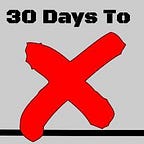Hey guys,
Robert Koch here. I’m currently sitting in a cabana on vacation, recovering from some terrible sunburn. Tropical climates aren’t all they’re cracked up to be.
Anyway, that’s besides the point (kind of).
What I want to talk about today is a subject that’s been done to death. So much so that there’s a good chance you’ll roll your eyes once I reveal it.
The topic?
Making money by writing eBooks.
Every site has an article on this, and “self-publish your own book” has become a sort of Generic Internet Business 101 cliche.
That said, some advice is popular because it works.
Personally, I make a nice monthly side income off Kindle eBooks. And most of my titles are “fire and forget.”
I wrote them, threw them on Amazon, and sell a few copies every month.
In this article, we’ll look the pros and cons of following this method. And, I’ll also share my three best tips for self-publishing.
The Biggest Downside To Self-Publishing
Before we get any further, it’s worth pointing out that anyone claiming enormous earnings off eBook is (generally speaking) full of it. Read a site like The Warrior Forum and you’ll see plenty of tall tales like: “How I’m earning $90,000 a week in one weird niche.”
Books, while profitable, are not the big earners most people hype them up to be.
Amazon’s royalty system penalizes anyone pricing their titles above $9.99. This means that the maximum most authors can make is $6.96 per copy book sold.
Sell eight books a day at this price point and you’re making less than minimum wage.
While, this makes self-publishing difficult to do full-time, it’s still a great form of side-income.
Sell one $6.96 book a day and you’re making an extra $2,540.40 a year.
That’s not life-changing money, but it’s enough to go on vacation or partially fund a retirement account.
Plus, once your book is published, it’ll sell indefinitely. I have titles from way back in 2013–2014 that still turn a (small) monthly profit.
Having a book still earning $10 — $15 a month three or four years after its release (and with you doing nothing to promote it) is always fun.
My Three Tips For Authoring Your First Book
Over the years, I’ve noticed three major factors that have had the biggest impact on my writing and determined whether or not I actually finished authoring the book I started.
Each of these is listed below:
1. Only Write About Topics You’re 100% Interested In
Have you ever been asked about a subject you love?
If it’s something you’re truly passionate about, you’ll never run out of things to say.
This is true for writing as well.
Unlike a blog post or sales letter, books require you to do lots of writing on a specific subject. As such, it’s pretty tough to simply “power through” a dull subject.
If you aren’t 100% in love with the topic, it’s not worth writing a book about.
I’ve learned this the hard way several times.
Trying to chase a trend, make a quick buck, or exploit an audience you don’t particularly like, are all going to wear you down pretty quick.
2. Plan Your Projects So You Can Finish Them Within One Week
One full week of writing (eight hours a day) is enough to knock out the rough draft for most books.
A 200 page book contains roughly 50,000 words. That’s about 50 hours worth of writing in total. Seven days of intense work is more than enough to get the job done.
3. Skip The Writer’s Retreats And Expensive Bootcamps
If you’re on any Internet marketing email lists, you’ve undoubtedly seen someone shilling for a “self-publishing bootcamp.” These are “how-to” courses generally priced between $197 — $30,000.
Don’t bother with them.
It takes a lot of $6.96 royalty payments to recoup a $30,000 (or even $100) price tag.
Likewise, “writer’s retreats” are basically the same thing.
As someone who’s made over five figures self-publishing, here’s all the material I ever studied on the subject:
- The Millionaire Fastlane — Not about self-publishing per se, but it’s what inspired me to start writing eBooks.
- Write. Publish. Repeat. — I read this book well after I got into self-publishing. As a result, much of its content was “old news.” That said, it’s still worth a read if you’re a complete newbie.
- How to Write and Sell Simple Information for Fun and Profit — Easily my favorite self-publishing book of all-time. Also covers a ton of other stuff, like writing articles and building your own membership sites. 10/10 highly recommended.
That’s my whole list. Aside from a few shorter genre specific books (like The Six-Figure Erotica Author, or How to Write A Damn Good Novel) that’s my entire formal education in the world of publishing.
10-Second Recap
- Most people will never get rich off self-publishing.
- Despite not being a “goldmine of easy money,” eBooks are still profitable.
- It’s better (and easier) to write about a topic you love than it is to chase trends.
- Books get done when you write them quickly, otherwise it’s easy to get writer’s block and quit.
- There’s no reason to pay $18,000 for a “self-publishing bootcamp.”
